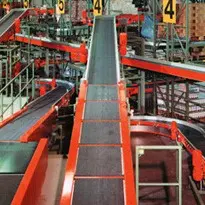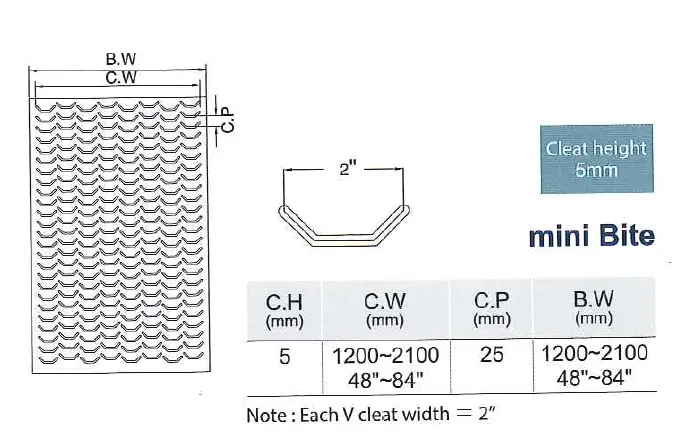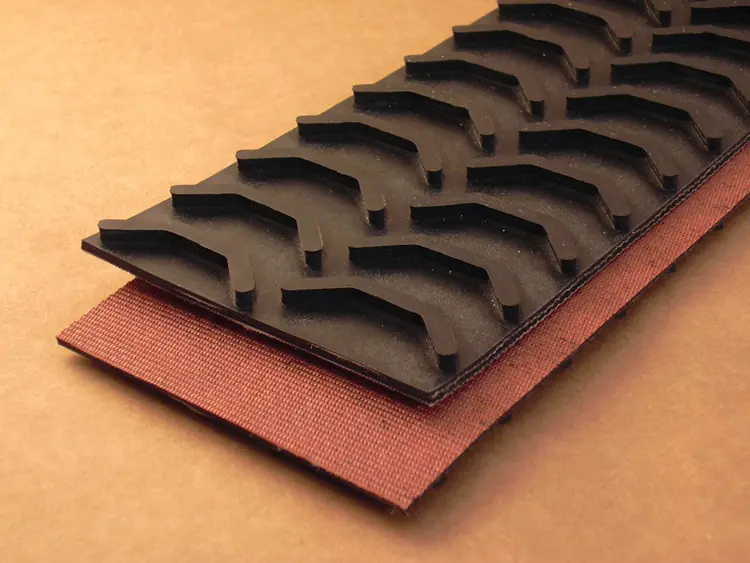NEWS



A light duty conveyor belt is specifically designed to handle lighter materials and loads in various industries. These belts are often characterized by their flexibility, ease of use, and adaptability. Unlike their heavy duty counterparts, light duty conveyor belts are typically made from materials such as cotton, EP (polyester), NN (nylon), PVC belting, and even Kevlar for added strength. These materials allow the belts to be lightweight yet durable enough to carry small to medium-sized items efficiently.
One of the main characteristics of light duty conveyor belts is their ability to perform well in settings where space and load requirements are minimal. For instance, you’ll often find them in industries such as food processing, packaging, and e-commerce warehousing, where the products being transported don’t require the heavy-duty support of more robust belts. The key here is versatility – light duty belts can be customized to fit specific operational needs, whether it’s a narrow conveyor in a retail setting or a wider one in a small manufacturing plant.
Additionally, light duty conveyor belts are known for their low-maintenance design, making them a cost-effective solution for businesses that need efficient material handling without breaking the bank. They’re easier to install, require fewer repairs, and generally have a longer lifespan in low-impact environments. This makes them an attractive choice for businesses looking to streamline operations without committing to the higher costs and complexities of heavy-duty belts.
These two types of belts serve very different purposes, and choosing the wrong one could lead to inefficiencies, equipment damage, or even issues with the pulleys in the conveyor system.
|
Criteria |
Heavy Duty Conveyor Belts |
|
|
Material Composition |
Typically made from materials like cotton, EP, and Kevlar. Lightweight, designed for non-heavy applications. |
Made from robust materials like reinforced steel or heavy-grade rubber. Built to withstand industrial environments. |
|
Weight and Load Capacity |
Best suited for transporting lighter loads. Ideal for industries like food processing, packaging, and small-scale manufacturing. |
Designed to handle bulk materials, large machinery, and heavy items. Favored in industries like mining, construction, and large-scale manufacturing. |
|
Flexibility and Versatility |
More flexible, easier to install, suitable for frequent adjustments or changes in the conveyor system. Folding and portable features make them adaptable to various layouts. |
More rigid, less adaptable. Typically installed in permanent environments like large manufacturing plants. |
|
Cost and Maintenance |
Generally more affordable in terms of initial cost and maintenance. Requires less structural support and simpler maintenance. |
More expensive upfront with intensive and costly maintenance, but built for longevity in challenging environments. |
|
Applications |
Perfect for industries like food processing, logistics, and packaging, where hygiene and efficiency are priorities. |
Built for industries where heavy lifting and durability are crucial, such as mining, construction, and bulk material handling. |
One of the most significant advantages of light duty conveyor belts is their cost-effectiveness. Compared to heavy-duty belts, the initial investment required for light duty belts is considerably lower. This makes them an ideal choice for small to medium-sized enterprises (SMEs) that may not have the budget to invest in more expensive heavy-duty systems. Moreover, maintenance costs are typically lower because these belts are easier to clean, repair, and replace when necessary.
Light duty conveyor belts are incredibly versatile. They can be adapted to fit a wide range of applications, from simple transportation of products in a warehouse to more complex processes like sorting and packaging in a production line. Their flexibility is particularly beneficial for businesses that need to frequently change their operations or accommodate different product sizes and shapes. Whether it's handling light materials or integrating into a larger system, light duty belt conveyors offer the adaptability needed for various industries.
Another key benefit of light duty conveyor belts is their energy efficiency. Since they’re designed to handle lighter loads, they require less power to operate. This not only reduces the overall energy consumption of a facility but also contributes to lower operational costs in the long run. In today’s world, where sustainability is a growing concern, businesses are increasingly looking for ways to reduce their carbon footprint, and light duty conveyor belts provide a greener solution.
Installing a light duty conveyor belt is a relatively straightforward process compared to heavy-duty alternatives. Because these belts are lighter and more flexible, they can be set up quickly, reducing downtime during installation. Additionally, the maintenance of light duty belts is typically easier due to their simple design and lightweight materials.
|
Type of Business |
Example Application |
Unique Benefit |
|
Small to Medium-Sized Enterprises (SMEs) |
A small packaging company can use a light duty conveyor belt to streamline operations |
Cost-effective solution for growing businesses. |
|
Retail and Packaging Industries |
Light duty conveyor belts help a busy e-commerce warehouse during the holiday season, ensuring products are packed, sorted, and shipped quickly and efficiently. |
Enhances speed and efficiency during peak seasons. |
|
Food and Beverage Industry |
A bakery uses light duty conveyor belts for food conveying, transporting freshly baked bread, ensuring products remain uncontaminated and safe. |
Hygienic and easy to clean for food safety. |
|
E-commerce and Warehousing |
Light duty conveyor belts reduce manual labor and speed up the sorting, packing, and shipping process in a fast-paced e-commerce warehouse, ensuring orders are fulfilled on time. |
Minimizes manual labor while increasing order accuracy. |
|
Warehouse Operations with Roller Applications |
Rollers, integrated with light duty conveyor belts, help handle packages of varying sizes and weights, reducing friction and enhancing efficiency in high-volume warehouses. |
Smooth handling of varied packages, reducing wear and tear. |
|
Agriculture and Farming |
Light duty conveyor belts are used in farms for sorting and transporting produce like fruits and vegetables, ensuring minimal damage while handling delicate items during the post-harvest process. |
Gentle handling to prevent damage to delicate produce. |
In addition to conveyor belts, roller applications play a crucial role in optimizing warehouse operations. Rollers are often integrated into conveyor systems to facilitate smooth movement of products, particularly in areas where gravity or manual force is used to move items. They are especially beneficial for handling packages of varying sizes and weights, as rollers provide consistent support and reduce friction. When combined with light duty conveyor belts, roller applications further enhance efficiency, allowing warehouses to handle high volumes of products with precision and speed.
Before choosing a light duty conveyor belt, it's essential to assess your business's specific needs. Consider the types of products you handle, their weight, and the volume you need to transport. Additionally, it's crucial to ensure that the belt meets conveyor belt standards relevant to your industry. For example, if you’re in the food industry, you might prioritize belts that are easy to clean and sanitize while also adhering to food safety standards. On the other hand, if you're in logistics, you may focus on belts that can handle varying sizes of packages efficiently while meeting durability and performance standards.
When selecting a conveyor belt, material and fabrication matters. Different materials offer various benefits, so it's important to choose one that suits your operational requirements. For example, if your business deals with high temperatures, a heat-resistant belt would be a better fit. Similarly, if you’re in an industry where static buildup could be an issue, opting for an anti-static belt would be wise. Durability is another key factor—ensure that the belt can withstand your specific operational demands.
Lastly, choosing the right supplier is crucial. Look for a supplier with a solid reputation such as HYC King for providing high-quality products, including options with perforation and excellent after-sales support. The last thing you want is to be left in the lurch if something goes wrong. After-sales support can include maintenance services, replacement parts, and customer service assistance to ensure your conveyor belt system runs smoothly for years to come.
Made from a variety of materials, including cotton, EP (Ethylene Propylene), NN (Nylon/Nylon), and Kevlar, our HYC King belts offer something for every industry. Whether you need a belt that’s oil-resistant, heat-resistant, or flame-resistant, King has you covered.




The low-noise operation of King light duty conveyor belts helps maintain a quieter work environment, improving worker concentration and reducing noise pollution during package handling and sorting.
These belts are built to withstand the harsh conditions of outdoor use, such as exposure to dirt, moisture, and varying temperatures, making them perfect for agricultural operations.
King belts are adaptable to automatic production lines, ensuring smooth and efficient operations with minimal interruptions, suitable for various manufacturing processes.
These belts provide reliable performance for handling luggage and cargo, ensuring smooth and efficient transport in busy airport environments.
With features like low-friction and customizable surfaces, King belts optimize the process of package handling, ensuring smooth, efficient movement of parcels of different sizes and shapes.

We use cookies to provide the services and features offered on our website, and to improve our user experience. By using this website, you consent to the use of cookies.